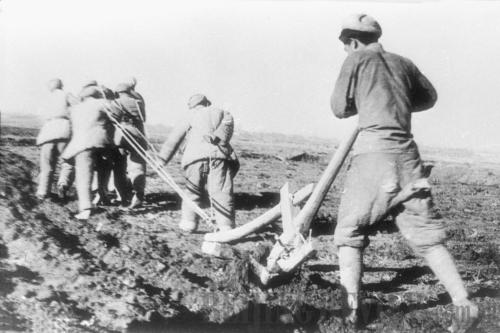|
 |
|
RECLAIMED OASIS: In the 1950s, due to the lack of animal power, the XPCC members had to work hard to transform wastelands into farmland (COURTESY OF THE XPCC) |
A better life
In the 1950s when the corps reclaimed land and grew food, they had to use primitive tools like spades, hoes and furrows that had to be pulled by men rather than livestock. Over the past six decades, the corps has tried to apply the most advanced technology available in its agricultural and industrial production, as well as in the fight against the spread of deserts.
At the Xinjiang Yinfeng Modern Agricultural Equipment Company, administered by the Communist League Farm under the jurisdiction of the Sixth Division of the XPCC in Wujiaqu, modern agricultural machines such as tractors, plows, planters and reapers sit in their parking lot.
According to Hu Xiaojiang, political commissar of the farm, the comprehensive agricultural mechanization rate in the corps has reached 93 percent, 26 percentage points higher than the country's average level. Apart from the machines working on land, 32 planes are also employed on the corps' farms, helping to sow seeds and spray pesticides.
The Yinfeng Company provides automation and mechanization services for cotton fields, from sowing to harvesting and packaging. After acquiring a newly developed planter from Xinjiang Academy of Agricultural and Reclamation Science, the production has increased by 23 percent. With nearly 1,000 cotton harvesters, the total area of machine-harvested cotton fields has exceeded 320,000 hectares. The corps' cotton fields account for less than 40 percent of Xinjiang's total, but they produce more than 50 percent of the region's total output. Meanwhile, mechanical harvesting is also used for beets, tomatoes, corn and other crops, greatly improving the efficiency of agricultural production.
A majority of the corps' regimental farms sit on the rims of deserts and borders, all severely water-deficient areas. Thus, to develop water-saving irrigation is the only option for the corps.
Xinjiang Tianye Co. Ltd. is a large state-owned company in the Eighth Division of the XPCC in Shihezi. The company began to implement its drip irrigation technology in 1999. Unlike traditional flood irrigation using canals and ditches, drip irrigation takes place under plastic film and involves injecting water gently to the roots of crops through holes. With this technology, about 60 percent of water consumption is saved over conventional irrigation. Drip irrigation also helps to control diseases and pests.
"Before this technology was used, cotton production was 1.02 tons per hectare, and today, thanks to drip irrigation, the production has more than doubled to 2.52 tons per hectare", said Chen Lin, Vice General Manager of the company.
Since 2004, the company has used drip irrigation for rice production, and they eventually received a patent for the technique in 2011. The technology can prevent water being lost through evaporation as well as leakage under the ground. The production of rice fields using drip irrigation can reach 12.45 tons per hectare, almost twice the national average.
According to Chen, when they first imported drip irrigation equipment from Israel, it was very expensive. Today, the company has independently developed a drip irrigation belt for a reasonable price, and together with some other innovative changes. The costs for equipment have been greatly reduced. Entering the information era, farmers in most regiments of the XPCC only need to click on their computers for the drip irrigation system to operate.
The development of large-scale enterprises as well as modern agricultural and industrial programs is undoubtedly contributing hugely to the corps' rapid economic and social progress. Meanwhile, corps members are also encouraged to run businesses so that they can make more money and live an increasingly better life, with support from the corps.
The corps is composed of more than 30 ethnic groups, accounting for 14 percent of the XPCC's total population. Around 80 percent of ethnic minority-inhabited regimental farms are located in areas suffering from economic underdevelopment. Helping these farms catch up with others is crucial.
The animal husbandry company of the 104 Regiment of the 12th Division was set up in 2008. Of its 136 households, 75 percent are Kazak. They used to live in the mountains and herd cows, sheep and horses. However, not only did increasing livestock compete with each other for grassland, but the ecology also began to deteriorate, making it difficult for the herdsmen to improve their life.
The corps then offered to help move some of them out of the mountains. To ensure that those who leave the mountains can earn a living and will not return, the company helped to open cow farms, where the members can place as many cows as they can afford.
The animal husbandry company now has 728 cows, shared between 32 households, said Sun Tianming, commander of the company. The cows are fed and managed together in accordance with modern agricultural practices. These households can nowadays earn more money than before and live a more comfortable life.
The company is only 18 km away from Urumqi. Given that most of the households are Kazak, the company decided to help members open restaurants centered on Kazak cuisine and culture, attracting a large number of tourists from Urumqi and other cities nearby.
The Nurya family moved out of the mountains five years ago. The wife is a college graduate, who helps operate their family restaurant. The family's annual net income stands at about 150,000 yuan ($23,800) a year. Talking about life here, the couple said they've already gotten used to it very well. "Particularly, we don't need to worry about how to keep ourselves warm in yurts during winter. We now have a central heating system," they said.
| 